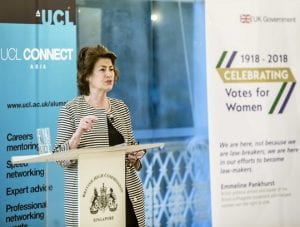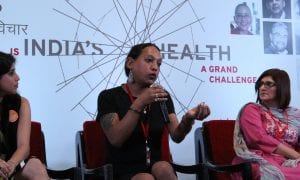What does gender equality have to do with global engagement?
By ucypsga, on 11 May 2018
This blog post is an extract taken from a speech that UCL’s Vice-Provost International Dr Dame Nicola Brewer gave at a joint UCL alumni/British High Commission reception in Singapore in March 2018.
 At UCL, global engagement and global citizenship are things that we take seriously. The first strategic driver of our Global Engagement Strategy is to offer our students the best possible preparation for global lives and careers.
At UCL, global engagement and global citizenship are things that we take seriously. The first strategic driver of our Global Engagement Strategy is to offer our students the best possible preparation for global lives and careers.
And we have a flourishing Global Citizenship Programme for our students that takes place in the summer term and which enables them to work in interdisciplinary teams on global challenges. That programme is (of course!) open equally to female and male students.
In my family, we were lucky to be able to give our own children (one girl, one boy) a good education, a global outlook, the appetite and confidence to travel and learn about other countries other cultures and to be comfortable with diversity.
Those are things that an in ideal world every child would be able to experience. I want every student at UCL – actually, I want every child in the world, but you have to start somewhere – to have the opportunities I was able to give our children. So how can that equal, global access be achieved?
One of the critical starting points in achieving real equality is finding male allies. In the home (where I was lucky, again, to have such a supportive partner), and at work (the new Director of the LSE, Dame Minouche Shafik, talks about the ‘holy trinity’ for working women: a supportive partner, a supportive boss and good childcare). Men and women need to work together for equality. It’s a cause that’s most effectively advanced by creating solutions together.
We need to reach out across countries, too. I think you need to start with the local, at home. Archbishop Desmond Tutu, a hero of mine, advocates that you should, “Do your little bit of good where you are; it’s those little bits of good put together that overwhelm the world.”
So, start local but then go global. Or, as UCL’s Global Engagement Strategy says, ‘Think global, act together’. And the way we act, and what we choose to act on, is equally important.
Sometimes people ask me how they can do that. Professor Dame Athene Donald, Master of Churchill College Cambridge, gave some great tips on International Women’s day this year.
Her blog started with a quote from one of my favourite novelists, George Eliot. In her 1876 novel Daniel Deronda, she wrote, “And when a woman’s will is as strong as the man’s who wants to govern her, half her strength must be concealment.”
Professor Donald continued, “Many women need to live their lives like that, even today… a strong woman may be seen as a threat.” And her blog then listed three things that everyone can do:
- Amplify the voices of a timid person, not necessarily a woman, though it might be, who makes a sensible comment that is talked over or ignored.
- Support someone you see being victimised or fretting over something.
- Be an active bystander; don’t ignore other people’s uncomfortable actions. If it’s clear things are getting out of hand, step in if it’s safe for you to do so.
Professor Donald finished her blog by referring to how far we’ve come. But I don’t think it’s far enough, and each of us has a role to play in making sure we keep moving forward.
At UCL, we call ourselves London’s Global University, and we can be a beacon for equality, as well as for world-class education and world-leading research.
Nicola is the Gender Equality Champion on UCL’s Senior Management Team and Co-Chair of UCL’s 50:50 Gender Equality Group
 Close
Close


